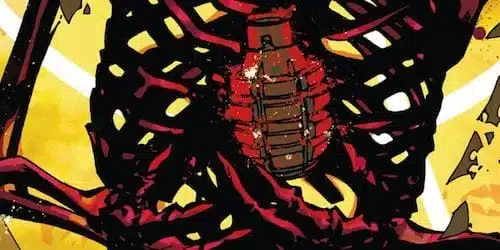
A major challenge both DC and Marvel face on a regular basis is how to highlight lesser-known characters. It’s a lot easier to sell a Superman comic because everyone already knows who Superman is, what his powers are, who he fights, his perspective on justice, and generally what to expect when you pick up an issue. In this sense, writers don’t necessarily have to spend time building up backstory or detailing personality elements because they’ve been somewhat established already. When it comes to the B-list, though, it takes more to grab readers’ attention and keep them reading. DC did well when they made a conscious effort to offer a number of titles that featured second-string characters in the New 52. While not the best sellers in DC’s catalog, titles like O.M.A.C., Demon Knights and All-Star Western prove how well these minor characters can perform when they’re well developed.
Suicide Squad is an anomaly of sorts, in this regard. Casual readers wouldn’t readily know who Deadshot, King Shark, or Voltaic are, but the inclusion of Harley Quinn as a team member raised the star power of the book due to her inclusion in the insanely popular Batman: Arkham Asylum video game. Thus, while Suicide Squad features mostly lesser-known characters, it’s been free from cancellation worries and has crossed over with a number of other titles over the past 21 months. Enter Ales Kot, who finds himself in the unique situation to basically reinvent Suicide Squad 20 issues into its run. Unlike Jim Starlin—who took the same opportunity and erased the events of the preceding 18 issues on Stormwatch—Kot has opted to not only flesh out the current roster of the Suicide Squad, but the concept of the team as well. It’s a risky move, one that could have potentially alienated fans of Glass’ work while not attracting new readers. Fortunately, Suicide Squad #20 is a fantastic jumping-on point for new readers and a great transition issue into a new era for the team.
Reading Suicide Squad #20 was interesting because my initial desire to do so came from a completely abnormal place. First, I read about Kot’s affinity for a more ‘alternative’ writing style and was intrigued as to how it would work on a title such as this. Second, I was interested to see if Suicide Squad, a series I’ve never been particularly interested in even before the New 52, could hold my attention under the right hand. Having not read any of Kot’s work before, and having little interest in the Suicide Squad in general, I was surprised by how much I enjoyed this issue.
Instead of jumping in headfirst, Kot takes the entire issue to set up his playing field, and he focuses on the core of what makes the Suicide Squad such a compelling concept: the expendability factor. Because every member is a documented super criminal, they’re lives are just as appreciated when extinguished as when they’re used for A.R.G.U.S. missions. Either way, everybody wins. It’s interesting that Amanda Waller, high-ranking agent of A.R.G.U.S. seems to have the most consistent characterization across the many titles she pops up in from time to time. Waller is an staunch authoritarian who doesn’t respond well to insubordination. And because the Suicide Squad is based on insubordination, her natural iciness is compounded.
But the issue also focuses on how perception plays a big role in how roles are defined. King Shark—the human/Hammerhead shark hybrid—isn’t a monster so much as he is a lonely, intelligent young man with uncontrollable animal instincts and hormones that shouldn’t have to be at odds. Deadshot hasn’t really been the leader over the past 19 issues, but rather just another pawn in Waller’s grand scheme who gets played as much as anyone else. Harley Quinn isn’t (necessarily) a psychopath, just a girl who fell in love with the wrong guy and got scarred because of it, though, deeply and more violent than most. Even the Unknown Soldier; a vicious man, yes, but mostly a military man with nowhere else to go and a drive for order in a wholly chaotic world.
The perception/defined role paradox of the team itself is that, for all it’s seriousness, all the money and time and energy that are invested, the consistently fatal danger, and the pretense of it being a program to use bad people to help good people, the Suicide Squad is simply a game. A.R.G.U.S., the team members, their enemies, whoever: they all see the Squad as the volatile bomb that it is. What else is there to do when there’s nothing to lose? Anything you can to get the job done. For Waller, that means having to take responsibility for a team of killers, monsters, and psychotics in service of the greater good.
Suicide Squad #20 is an excellent comicbook. Recently, DC has been taking a note from Marvel’s diary and hiring new, young writers who are bringing their unique visions to titles like this who have suffered from mediocrity since the New 52 relaunch. In one issue, Ales Kot has turned Suicide Squad into one of my must-read titles each month.
